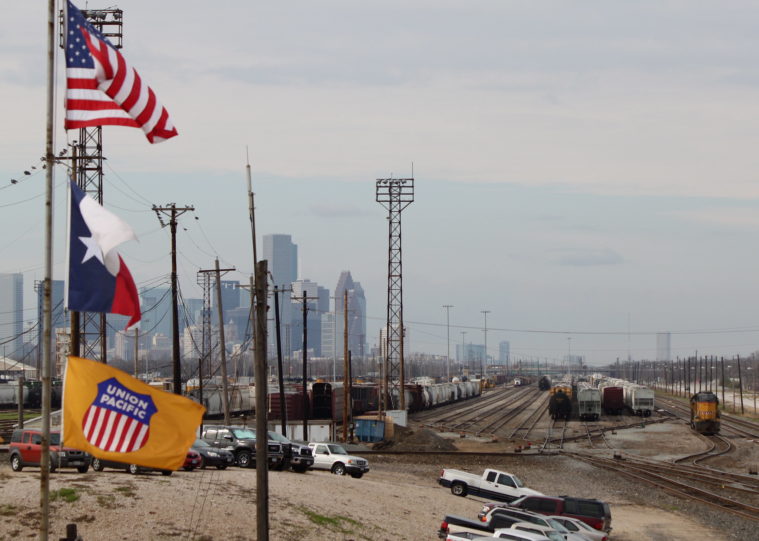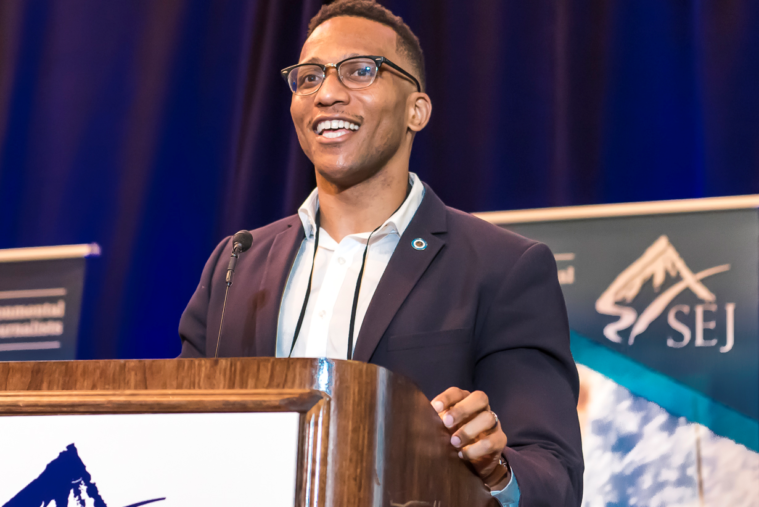Environmental leaders gathered at the Texas state Capitol in July to urge legislators and Attorney General Ken Paxton to hold companies accountable for a series of industrial disasters, including the 2019 Intercontinental Terminals Company fire in Deer Park and the 2021 ExxonMobil refinery fire in Baytown.
One disconcertingly young, bespectacled figure in a suit and sharp fade stood out: Harris County Attorney Christian Menefee.
“The state of Texas has methodically and systematically worked to tie local officials’ hands in holding corporate polluters accountable in the wake of large-scale environmental events,” Menefee declared before the cameras. Communities on the fence lines of these facilities need relief and accountability, he said, adding that in his view, “Local government is best positioned to make that happen.”
Back in Houston, Menefee’s role involves much more than fighting pollution—he represents the county government in all matters of civil law. But due to the county’s concentration of polluters and the clear need to protect its citizens, the Harris County Attorney’s office has long prioritized the environment. Menefee, however, faces unprecedented challenges: In direct response to his predecessors’ work, the state Legislature severely curtailed local governments’ authority to act on environmental incidents like the ITC and Exxon fires, and to punish the companies responsible.
Menefee, who began his term last year, is just 34: He is Harris County’s youngest and first Black elected county attorney. While far from the only local official fighting pollution, Menefee has become one of the most visible and vocal, especially about taking the state of Texas to task. He’s focusing the office’s legacy of environmental activism more squarely on protecting historically marginalized communities from disproportionate harm. And he is deploying increasingly creative legal tactics to do this work.
“The state of Texas has methodically and systematically worked to tie local officials’ hands in holding corporate polluters accountable in the wake of large-scale environmental events.”
He recently filed a lawsuit against the Texas Commission on Environmental Quality (TCEQ) over its permitting process for controversial concrete batch plants, accusing the agency of discrimination for not providing opportunities for the public to participate in Spanish. This summer, his office also teamed up with the City of Houston and local environmental group Bayou City Initiative to declare their intent to sue Union Pacific over toxic creosote at an old rail yard, following on the heels of a lawsuit filed by residents of the contaminated neighborhoods.
“We really just started prioritizing this work because the need was so great,” Menefee said. “It’s unavoidable.”
Menefee was born in California, but grew up in Harris County, where his military veteran parents have their roots. He attended public schools, graduating from Alief Hastings High School in Houston, and attended the University of Texas at San Antonio after navigating applications on his own as a first-generation college student.
Menefee briefly left Texas to attend law school at Washington University in St. Louis. He intended to become a public defender, and even interned at the Harris County Public Defender’s office. His motivation was partly personal—some of Menefee’s own family members have been swept up in the criminal justice system. Then as a student, he became “enthralled” by the saga of Enron after watching the documentary Enron: The Smartest Guys in the Room, and contemplated a life of federal prosecution against corporate crooks instead.
“The idea of putting guys in suits who do wrong by people behind bars was really attractive,” Menefee said. “I felt like there are a bunch of lawyers out there who put everybody else in jail. Wouldn’t it be interesting to be one of the lawyers who put the guys in suits in jail?”

Upon graduating, Menefee, saddled with student loans, briefly turned corporate himself—working first at the multinational Norton Rose Fulbright, then at Kirkland & Ellis, the largest law firm in the world in terms of revenue. His political opponents these days paint Menefee as being anti-industry. But in his previous life at those law firms, he represented oil and gas giants.
“I’m not some anti-business person who’s running out filing lawsuits just to file them. No. What I’m asking for is a fair playing field,” he explained.
The seeds of his political career were planted in 2016 at an ill-fated watch party for the presidential election. After Donald Trump won, Menefee, like so many others, became more involved in civic organizations and politics, ultimately putting his own hat in the ring for county attorney in 2020.
Campaigning for bail reform and progressive advocacy for county residents, he defeated incumbent Vince Ryan, a Democrat who’d held office for a full decade, in the primary and Republican candidate John Nation in the general election. Menefee took office in January 2021.
The proliferating concrete batch plants and lingering creosote that Menefee has targeted so far are just two examples of pervasive industrial pollution in Harris County, which hurts everyone in the metro area but tends to be worse in neighborhoods with more Black and Latino residents. Houston advertises itself as “the energy capital of the world,” and the ship channel—surrounded by low-income neighborhoods full of people of color—is home to a dizzying array of petrochemical facilities. The metro area regularly reports unhealthy air quality and monitors for toxic pollution in the air above the ship channel. This month, the EPA declared the eight-county area around Houston to be severely polluted with ground-level ozone, a component of smog that aggravates asthma, bronchitis, and other lung conditions.
Along with a history of pollution, Harris County has a history of fighting back. Menefee isn’t alone among local elected officials of color who are making environmental justice a priority for their terms: so are Harris County Judge Lina Hidalgo and Houston Mayor Sylvester Turner. And for years, career public servants—like the staff of the Harris County Pollution Control Services Department and the Houston Health Department—have toiled to track pollution and uncover its harmful health effects.
This is especially apparent when it comes to creosote contamination in Houston’s Fifth Ward and nearby Kashmere Gardens, a tight-knit, historically Black neighborhood. The issue is important to Menefee personally—his grandmother and other family members lived in the Fifth Ward—and has blown up into an emergency demanding local, state, and federal attention.

Creosote, a chemical used to treat and preserve wooden rail ties, had been dumped into an open pit at the century-old Englewood Rail Yard, and from there the probable carcinogen had spread by soil, water, and air throughout the area. Residents noticed more and more cancer deaths in their community over the years, culminating in multiple state studies in 2020 and 2021 that confirmed the presence of a cancer cluster. The Houston Health Department worked with community leaders to steer the state through these studies, which revealed a shockingly clear pattern: Many census tracts around the rail yard had unusually high rates of several kinds of cancer.
“We really didn’t expect a cancer cluster report to come back as it did,” said Loren Hopkins, the chief environmental health officer at the city’s health department. It’s normally difficult to detect a statistically significant increase in cancer cases, but here the numbers were obviously high, she said. “That is very, very telling, and very upsetting, and very concerning.”
Union Pacific had previously submitted a permit application for cleanup to TCEQ’s industrial and hazardous waste program, but Hopkins, Menefee, and community members all took issue with the company’s proposal. It didn’t seem to adequately contain the creosote, or account for how it has already polluted surrounding neighborhoods.
Residents had already sued Union Pacific in Harris County district court, but one activist attorney began pushing to sue the company using the under-utilized federal Resource Conservation and Recovery Act, which gives the EPA authority to regulate hazardous waste. Jim Blackburn, an environmental lawyer who founded Bayou City Initiative and also teaches at Rice University, took the issue to his students and had them draft a notice of intent to sue.
“This Union Pacific problem has been festering for a long time, and traditional pathways just really weren’t working for a speedy cleanup,” Blackburn said.
“It’s very seldom that the city, the county, and the environmental groups come together.”
He invited Houston and Harris County to participate in planning a federal lawsuit, and was gratified that leaders in both governments agreed. “It’s very seldom that the city, the county, and the environmental groups come together,” Blackburn noted.
While they haven’t actually filed the lawsuit yet, the announcement provided leverage to get Union Pacific to negotiate with the parties to hammer out a more comprehensive solution than the one submitted to TCEQ. The state’s typical bureaucratic process for hazardous waste cleanup is slow, often taking multiple years for review and approval, and the cancer cluster finding had given the situation much more urgency, Blackburn said. A site-specific remediation plan also doesn’t address harms already suffered by the community.
“We can’t just address remediation, because that’s for future populations. What do we do about the decades of exposure and damage to the people that are there now?” asked Hopkins, whose efforts to collect data and study the pollution’s health effects spurred much of this action. (The discoveries continue: Houston officials revealed cancer-causing dioxin was found in 42 samples Hopkins and her colleagues collected this summer near the Union Pacific site.)
As county attorney, Menefee is building on the work of his fellow Harris County residents. But he seems uniquely skilled at steering the public spotlight toward these problems, putting his youth, charisma, PR savvy, and confrontational legal strategies to work in the service of environmental justice.

For example, his complaints to the EPA—together with complaints from Lone Star Legal Aid—over TCEQ’s permitting process for concrete batch plants in Harris County have just prompted a federal civil rights investigation. These plants are placed disproportionately in majority Black and Latino neighborhoods, and yet Spanish-speaking residents aren’t always able to access information or provide public comment on their presence, the complaints allege. On this matter and others, other experts say Menefee is addressing a vacuum left by TCEQ and other state leaders.
“I think TCEQ has pretty much abdicated any of its responsibility,” said Jennifer Hadaiya, executive director of the local environmental justice group Air Alliance Houston. “At the city level, at the county level, we are seeing elected officials… who are willing to fill the gap that our state regulatory agencies are not.”
This is precisely how Menefee himself views his role: to continue to use the clout of Harris County, which has a larger population than most U.S. states, to fill the gap in what the state is willing to do.
He pointed out that in 2015 the Texas Legislature passed a law restricting the damages local governments can collect from litigation over pollution. In another measure aimed at reining in Harris County, as of 2017 Texas requires local officials to notify the state of environmental enforcement cases they wish to take on, and give the state government the option of taking these cases instead. Now, it’s up to Menefee to get around these constraints.
“When it’s necessary to have a fight with the state of Texas, we will do that,” he said. “We’re at a time now where the state is actively engaged in hostile activity against Harris County. … What time better than now to have a county attorney who’s not scared of those fights?”
The state leadership aside, Menefee is part of a nationwide wave of elected officials who are paying more attention to environmental justice issues. There’s growing political momentum (and funding) to clean up long-standing and unequal pollution, and to address the harms to communities around the country. But both action and results need to follow.
According to Hadaiya of Air Alliance Houston, the Harris County attorney at least is doing his part.
“He has made it very clear not only in his words, but also in his actions and in the direction he’s given his office, that they will take action against industry, against regulatory agencies that are not assuring the public and environmental health of our community,” she said. “I think that County Attorney Menefee is a true champion for environmental justice.”







